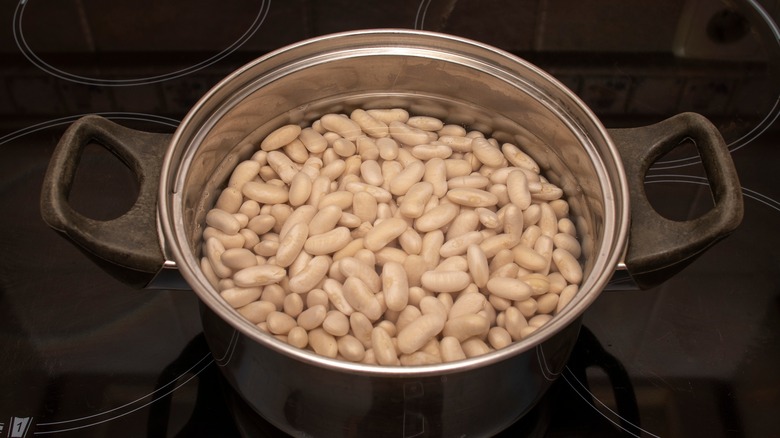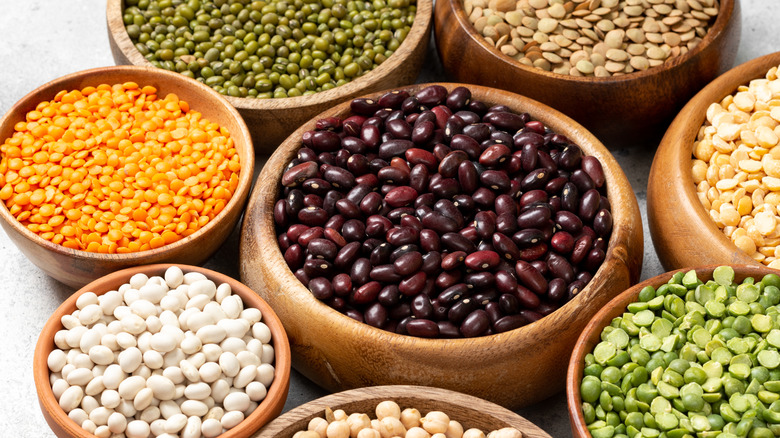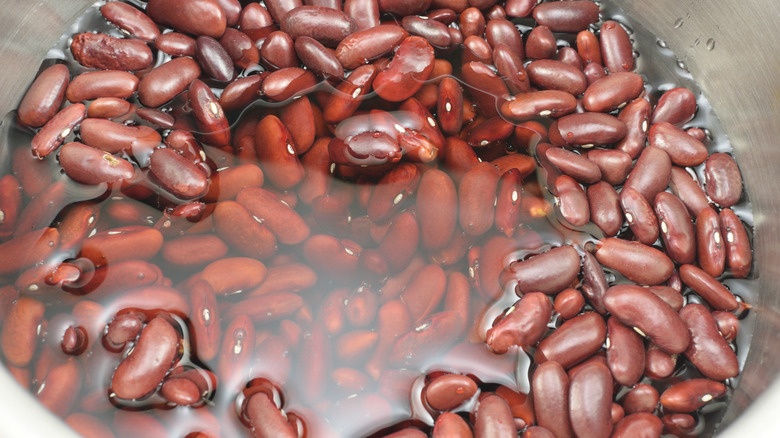The Water Problem That Could Be Ruining Your Beans
Beans of all kinds are nutrient-rich sources of fiber and protein, vitamins, and minerals. They can provide potassium, magnesium, and iron. According to North Dakota State University, beans have also been linked to decreased risk of heart disease, obesity, and even some types of cancer. And if that weren't enough, beans are also cost-effective and sustainable. There's even a movement called Bean Is How that aims to double how many beans and legumes are eaten globally by 2028. Beans are having a serious moment.
This means that there's no better time than now to perfect your bean cooking technique and start enjoying bean dishes from around the world — which can sometimes be a bit of a challenge. Working with dried beans, cooking can be a long process, and you can even reach the point where you have been boiling for far longer than seems necessary with nearly no change in texture. If this is happening, it could be the result of using dried beans that are too old. However, it could also be the fault of your water.
Hard water has high levels of calcium and magnesium, and it's quite common — in fact, 85% of households in the U.S. have hard water. If you're using hard water to boil your beans, the minerals present could be making it more difficult for the beans to soften. Simply using hard water can lead to a much slower cooking time (and no one wants to be waiting hours for their meal).
Avoid hard water to correct the texture and time
Now hard water is safe to drink and won't hurt you if you consume it, but you may notice its effects on the dryness of your hair and skin and even the function of your appliances. You'll also notice the ways it impacts your cooking.
The calcium and magnesium in hard water connect on a molecular level and fortify the pectins in the cell walls of beans. Pectin is a soluble fiber that you'll find in most fruits and vegetables' cell walls; it's a thickening agent, which is why you can buy pectin commercially to help jams and jellies set, but that's also why you don't want it to be strengthened in your beans. When the calcium and magnesium in the hard water penetrate the cell walls, the beans become less soluble and are prevented from becoming soft easily. You can boil for hours without achieving the texture you're looking for.
An easy fix is to avoid the tap entirely and rely instead on distilled water. Distilled water won't have hard water's mineral-rich quality, so the added calcium and magnesium can be circumvented.
Give hard water a hard time
If you don't have distilled water readily available, you don't have to abandon your bean cooking plan (or schedule hours upon hours of cooking time). There are a few other ways to help correct the hard water and hard bean problem. You can start by treating your beans to a saltwater soak. Even though there are debates around whether you actually need to soak your beans, there's no need to worry about saltwater slowing the rate of water absorption.
Salt can help both before and during cooking. A brine before cooking allows some sodium ions to take the place of the calcium and magnesium ions already present in the beans, which will let more water penetrate the skins. Brining beans in baking soda and salt water will help them soften properly too. If you add salt to the water during cooking, it will also speed up the process.
You can also try softening your hard water, even if you don't have a water softener. There are filters and chemicals you can use, but you can also just pre-boil it. Some of the minerals in the hard water will settle at the bottom once it's boiled, allowing you to scoop them or strain them out and leaving behind much softer water that's better for cooking your beans.


